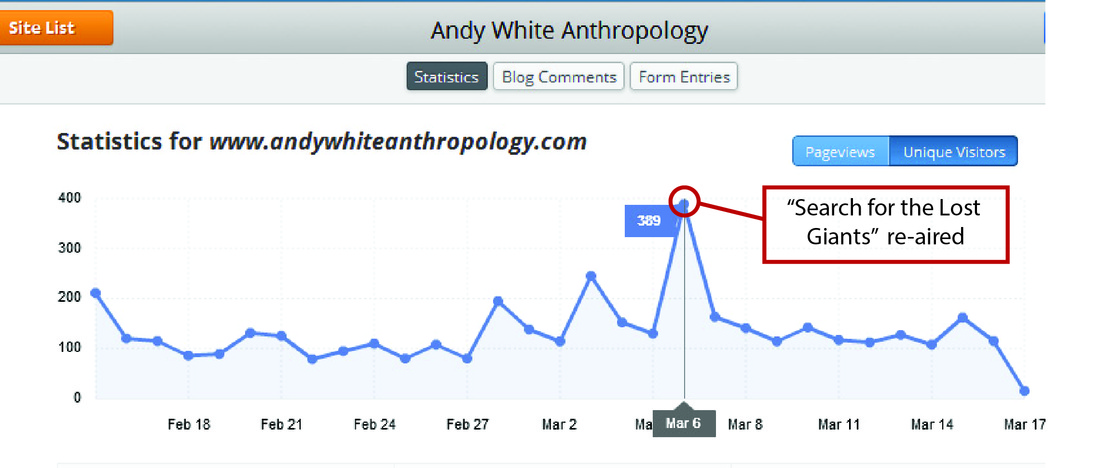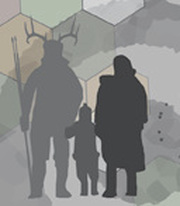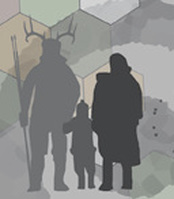A waste of time? I don't think so. As I argued in this post, I think professional archaeologists should engage with fringe notions about the past. When I wrote that post, my views were largely based on principles. After several months in the trenches, I can tell you that I think that engagement is even more important now than I did originally. The more I have learned about the resurgent belief in giants, the more I have begun to understand that it is not some stand-alone, quaint notion that is based simply on fantasy or misinformation. In many cases, modern belief in giants is tied to religious fundamentalism, anti-intellectualism, New Age spirituality, the supernatural/occult, and other stuff that you might find surprising (here is one post about what I called the "Nephilim whirlpool"). If you scratch a giant enthusiast you may find any any number of things right under the surface: a white supremacist, a Holocaust denier, a conspiracy theorist . . . That's not to say, of course, that everyone who is interested in giants has some kind of sinister agenda. But the modern enthusiasm for giants (and the passionate defense of their existence) is at the intersection of many different belief systems, not all of which are "quaint." That's worth trying to understand.
I never thought that I'd have much of an impact on the "true believers," but I thought I might be able to provide some information to those who still hadn't made up their minds. Have my efforts made any difference? I think they have.
One way I know I'm having an impact is that people who are curious about giants are finding this website. I don't get a tremendous amount of traffic: on a typical day, I'll get around 100 unique visitors; when I publish a new blog post that gets shared or re-tweeted a few times, the numbers will be slightly higher. When the History Channel re-aired all six episodes of "Search for the Lost Giants" on March 6, the traffic to my website was easily double what it would normally be. I am now the number one search result for a Google search of the infamous phrase "double rows of teeth."
Finding the site is one thing, being affected by it is another. I don't know what reaction a person has to my work on "giants" unless he or she comments on a post or sends me a message. I've gotten some negative comments, but also a lot of positive ones. And I've also gotten messages like this one:
"In the absence of people like you, Andy, the giant stuff seems very persuasive to inquisitive minds like mine. It has been extremely hard for me to find scientists willing to take the time to thoroughly debunk this stuff. In fact, I didn't hear about you until I called the NY Smithsonian and the Hopewell Culture National Historic Park. Some anthropologists there referred me to your FB page. . . .
So far I'm really loving everything that you have written. You are literally the only person that people keep referring me back to, so it would suck for people like you to give up or quit because you are kind of a catchers mitt for people like me. I just wish that someone of your caliber would deal with some of the other stuff. for instance, I'm absolutely convinced that there is a large primate in North America. The evidence seems overwhelming. But I also have to acknowledge that I still haven't come across any good arguments against it. I'm sure you're either too tired, too busy, or simply disinterested in Sasquatch to take time, but it's precisely because people like you steer clear that people like me get sucked into this crypto stuff, lol. You know, the absence of good counterarguments."
There you go: the person wants counterarguments. He's interested, actively looking for information, and wants a counter-point to the interpretations and "evidence" he finds online. We need to provide that counter-point. And we need to do more than simply assert that an idea is unsupported or silly: that's a dismissal rather than a counterargument. We need to consider "evidence," take the time to develop an interpretation that has scientific merit, and make that interpretation available and accessible.
I'm a member of several Facebook groups that are concerned with the ancient world. I recommend joining these groups if you're a professional and you're interested in seeing how ideas about the past are being used to further political, racial, social, and religious agendas. The maturation of social media has made it easier than ever before to amplify nonsense ideas. And, as I have learned with my exploration of the modern mythology of giants, those ideas often intersect with agendas and belief systems that extend far beyond a simple interest in prehistory. It's worth paying attention to.



 RSS Feed
RSS Feed
